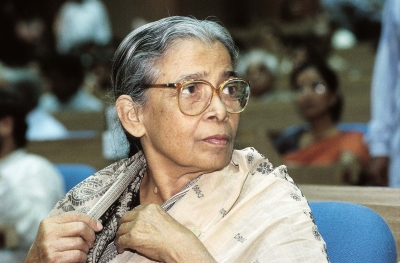
Mahasweta Devi (14 January 1926 – 28 July 2016) was an Indian fiction writer in Bengali and a socio-political activist. Her notable literary works include Hajar Churashir Maa, Rudali, and Aranyer Adhikar. She was a self-recognised communist and worked for the rights and empowerment of the tribal people (Lodha and Shabar) of West Bengal, Bihar, Madhya Pradesh and Chhattisgarh states of India. She was honoured with various literary awards such as the Sahitya Akademi Award (in Bengali), Jnanpith Award and Ramon Magsaysay Award along with India’s civilian awards Padma Shri and Padma Vibhushan.
Devi wrote over 100 novels and over 20 collections of short stories primarily written in Bengali but often translated to other languages. Her first novel, titled Jhansir Rani, based on a biography of the Rani of Jhansi was published in 1956. She had toured the Jhansi region to record information and folk songs from the local people for the novel.
Mahasweta Devi’s specialisation lied in the studies of Adivasi, Dalit and Marginalized citizens with a focus on their women. They were associated as protestor in the face of the oppressive British rule, the Mahajanas and upper class corruption and injustice. She lived in the Adivasi villages in West Bengal, Bihar, Madhya Pradesh, Chattisgarh years afer years, befriending them and learning from them. She has embodied their struggles and sacrifices in her words and characters. She had claimed that her stories aren’t her creation, they are the stories of the people of her country. Such an example is her work ” Chotti Mundi Ebong Tar Tir”
In 1964, she began teaching at Vijaygarh Jyotish Ray College (an affiliated college of the University of Calcutta system). In those days Vijaygarh Jyotish Ray College was an institution for working-class women students. During that period she also worked—as a journalist and as a creative writer. She studied the Lodhas and Shabars, the tribal communities of West Bengal, women and dalits. In her elaborate Bengali fiction, she often depicted the brutal oppression on the tribal people and untouchables by the powerful authoritarian upper-caste landlords, money-lenders, and venal government officials. She wrote of the source of her inspiration:Postcolonial scholar Gayatri Chakravorty Spivak has translated Devi’s short stories into English and published three books Imaginary Maps (1995, Routledge), Old Woman (1997, Seagull), The Breast Stories (1997, Seagull).
Picture Credit : Google

